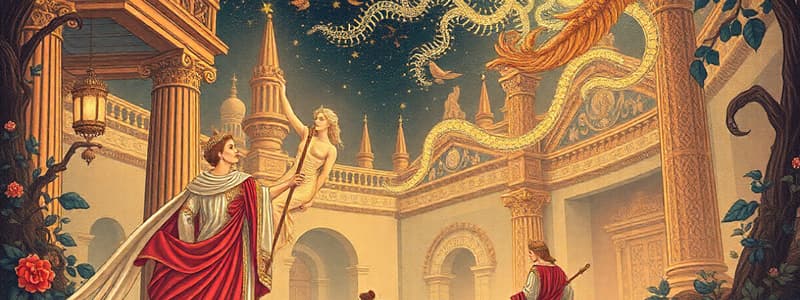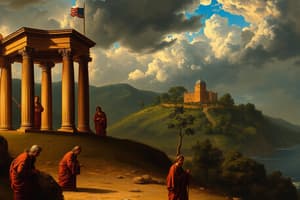Podcast
Questions and Answers
What group founded the Roman Republic after ousting the Etruscan king?
What group founded the Roman Republic after ousting the Etruscan king?
- The Plebeians
- The Senators
- The Patricians (correct)
- The Tribunes
What was the main function of the tribunes in the Roman Republic?
What was the main function of the tribunes in the Roman Republic?
- To create laws for the Senate
- To represent and protect the rights of the plebeians (correct)
- To elect consuls
- To serve as military leaders
What does the term 'veto' mean in the context of Roman governance?
What does the term 'veto' mean in the context of Roman governance?
- To amend
- To forbid (correct)
- To propose
- To agree
Which of these statements about the Senate in early Rome is true?
Which of these statements about the Senate in early Rome is true?
In what year did the plebeians first elect a tribune?
In what year did the plebeians first elect a tribune?
What was one reason Rome was able to build and maintain a vast empire?
What was one reason Rome was able to build and maintain a vast empire?
What geographical feature helped protect Rome from invaders?
What geographical feature helped protect Rome from invaders?
Who were Romulus and Remus in Roman mythology?
Who were Romulus and Remus in Roman mythology?
What is the significance of April 21, 753 BCE, in Roman history?
What is the significance of April 21, 753 BCE, in Roman history?
What role did the Tiber River play in the founding of Rome?
What role did the Tiber River play in the founding of Rome?
Which of the following statements is true regarding early Roman society?
Which of the following statements is true regarding early Roman society?
What motivated the Romans to extend citizenship to conquered peoples?
What motivated the Romans to extend citizenship to conquered peoples?
What ultimately happened to Romulus and Remus's relationship?
What ultimately happened to Romulus and Remus's relationship?
Flashcards
Republic
Republic
A form of government where elected officials represent the people.
Patricians
Patricians
The powerful and wealthy noble families of ancient Rome who originally held most of the political power.
Plebeians
Plebeians
The common people of ancient Rome, including merchants, farmers, and artisans.
Tribune
Tribune
Signup and view all the flashcards
Veto
Veto
Signup and view all the flashcards
Empire
Empire
Signup and view all the flashcards
Citizenship
Citizenship
Signup and view all the flashcards
Unification
Unification
Signup and view all the flashcards
Ford
Ford
Signup and view all the flashcards
Seven Hills of Rome
Seven Hills of Rome
Signup and view all the flashcards
Romulus and Remus
Romulus and Remus
Signup and view all the flashcards
City-state
City-state
Signup and view all the flashcards
Etruscans
Etruscans
Signup and view all the flashcards
Study Notes
Roman Empire Rise
- Early empires centered in the East (Egypt, Mesopotamia, China, India, Greece)
- Rome, on the Italian peninsula, began building an empire around 387 BCE
- Rome controlled the Western world for over a thousand years
- Rome's growth was partly due to its treatment of conquered people. Initially, Rome extended citizenship rights to conquered populations. This often led to the conquered people joining the Roman army.
- Rome unified most of modern Italy by 265 BCE
Roman Geography and Location
- Rome's location along the Tiber River facilitated travel and trade
- The Tiber River had a ford, making river crossings easier
- Rome's seven hills provided natural defense, offering lookout points and making it hard for invaders to approach
- Rome's proximity to farmland, wood, and stone resources supported its development
Mythical Origins: Romulus and Remus
- Romulus and Remus, twin brothers, were believed to have founded Rome.
- A king had them tossed in the Tiber River, but they were saved by a she-wolf.
- They founded the city on the Tiber River; a dispute arose, and Romulus killed Remus.
- Rome was named after Romulus, its legendary founder.
Early Roman Communities and Rule
- Initially, Rome comprised small communities developing into city-states.
- Early Rome was often ruled by kings from wealthy families.
- Around fifty years after Romulus founded the city, legends suggest the Etruscans conquered the Romans.
- The Etruscans were brutal rulers; later expelled by the Patricians.
Patricians and Plebeians: The Roman Republic
- Patricians were the noble families of Rome.
- In 509 BCE, patricians expelled the Etruscan king and established the Roman Republic.
- A republic has elected officials.
- Senators were elected by the Patricians serving their interests.
- Two Consuls served in place of the King.
- Plebeians (merchants, farmers, artisans) were allowed to vote but lacked Senate representation.
- In 471 BCE, plebeians elected Tribunes.
- Ten Tribunes were elected to represent plebeian interests against potential oppression by patrician consuls.
- By 287 BCE, plebeian laws bound all Romans.
Roman Governance
- The Senate met in the Forum (marketplace).
- Senators handled military and foreign affairs.
- Tribunes protected plebeians' rights and could veto laws (veto meaning "I forbid" in Latin).
Studying That Suits You
Use AI to generate personalized quizzes and flashcards to suit your learning preferences.





